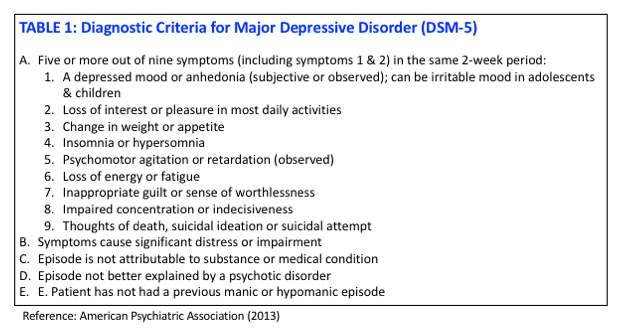 We have covered substance abuse - specifically cigarettes and alcohol - over the past few days. This invariably will lead to a discussion about depression, since the two are usually correlated. Depression actually affects women much more than men. Nevertheless, given its rising incidence across the world and the persistent stigma surrounding it, we feel the need to address this issue in our Movember series. What is Major Depressive Disorder?
We have covered substance abuse - specifically cigarettes and alcohol - over the past few days. This invariably will lead to a discussion about depression, since the two are usually correlated. Depression actually affects women much more than men. Nevertheless, given its rising incidence across the world and the persistent stigma surrounding it, we feel the need to address this issue in our Movember series. What is Major Depressive Disorder?  Major Depressive Disorder (MDD), or depression for short, is a disorder in which the sufferer experiences a depressed mood due to changes in the brain's physiology. It is currently not clearly understood, but MDD is thought to be caused by decreased serotonin and noradrenaline neurotransmitter activity.
Major Depressive Disorder (MDD), or depression for short, is a disorder in which the sufferer experiences a depressed mood due to changes in the brain's physiology. It is currently not clearly understood, but MDD is thought to be caused by decreased serotonin and noradrenaline neurotransmitter activity.  Care must be taken to differentiate 'having depression' from 'feeling depressed'. Feeling depressed is a normal occurrence that all of us experience, be it due to receiving bad news or just having a bad day. Depression, on the other hand, causes a depressed mood regardless of how well the sufferer's life has been going. For example, you might have heard of various wealthy celebrities having this MDD condition.
Care must be taken to differentiate 'having depression' from 'feeling depressed'. Feeling depressed is a normal occurrence that all of us experience, be it due to receiving bad news or just having a bad day. Depression, on the other hand, causes a depressed mood regardless of how well the sufferer's life has been going. For example, you might have heard of various wealthy celebrities having this MDD condition.  There is a certain set of criteria (from a handbook called DSM-5) to determine if a person is suffering from MDD. On top of the depressed mood, the person would also feel lethargic and an inexplicable guilt or worthlessness, experience sleep disturbances and cognitive impairment, lack appetite to eat, lose interest in things they'd normally find interesting, and psychomotor retardation or agitation. There may also be suicidal thoughts. Why is recognising MDD important? We are facing a sharp increase in mental health issues across the world. This could be due to better recognition and diagnosis of MDD as more research is done into this disorder. Nevertheless, there is still much room for improvement in terms of raising awareness and removing stigma around MDD.
There is a certain set of criteria (from a handbook called DSM-5) to determine if a person is suffering from MDD. On top of the depressed mood, the person would also feel lethargic and an inexplicable guilt or worthlessness, experience sleep disturbances and cognitive impairment, lack appetite to eat, lose interest in things they'd normally find interesting, and psychomotor retardation or agitation. There may also be suicidal thoughts. Why is recognising MDD important? We are facing a sharp increase in mental health issues across the world. This could be due to better recognition and diagnosis of MDD as more research is done into this disorder. Nevertheless, there is still much room for improvement in terms of raising awareness and removing stigma around MDD.  All of us have a part to play in educating ourselves about the symptoms of depression. Because of how the disorder is, sufferers tend to withdraw and isolate themselves from society. Basic interaction with others will become such a drain on their already-low levels of energy that they rarely seek help on their own. It is then up to the community to recognise this scenario and assist them in getting the medical attention they need. How does this relate to men's health? Though MDD currently seems to affect women more than it does men, men suffer disproportionately more. This might be due to the traditional idea of masculinity, reinforcing the notion that men have to be strong, independent, and stoic; seeking help can then (mistakenly!) feel like a display of weakness. While this societal gender construct will take time to be demolished, it is important to remind ourselves that it should definitely not apply to times of illness. If you (or anyone you know) are depressed and need someone to talk to, Befrienders has a 24-hotline at
All of us have a part to play in educating ourselves about the symptoms of depression. Because of how the disorder is, sufferers tend to withdraw and isolate themselves from society. Basic interaction with others will become such a drain on their already-low levels of energy that they rarely seek help on their own. It is then up to the community to recognise this scenario and assist them in getting the medical attention they need. How does this relate to men's health? Though MDD currently seems to affect women more than it does men, men suffer disproportionately more. This might be due to the traditional idea of masculinity, reinforcing the notion that men have to be strong, independent, and stoic; seeking help can then (mistakenly!) feel like a display of weakness. While this societal gender construct will take time to be demolished, it is important to remind ourselves that it should definitely not apply to times of illness. If you (or anyone you know) are depressed and need someone to talk to, Befrienders has a 24-hotline at








